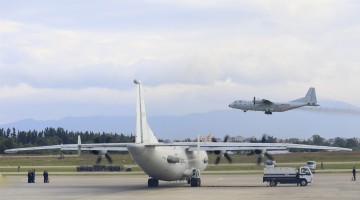By Chang Zhuang and Sun Guangbo
NASA and the US Defense Advanced Research Projects Agency announced in late January that they will work together in the development of nuclear-powered rockets in preparation for manned Mars exploration missions. However, while busy advancing the space exploration project, NASA Administrator Bill Nelson made negative remarks about China, claiming that China and the US were "in a space race" and warning the US government to "watch out that they don't get to a place on the moon under the guise of scientific research".
Since taking office as head of NASA, Bill Nelson has repeatedly accused China of peaceful space exploration activities, falsely claiming that China's space program is a military program and groundlessly accusing China's aerospace industry of stealing technology and ideas from other countries. Arguments like this are not uncommon in American political and military sectors. The US has spared no effort to distort the facts and label other countries as "space competitors" and "space threats", aiming to create excuses to seek space superiority. This reflects the hegemonic thinking and Cold War thinking of the US.
Drumming up "competition" to continuously increase space investment. In recent years, the US has made winning the great power competition among a national strategic priority and has viewed space as an important area of competition. It has issued documents intensively to shape the perception of advancing space strategy and strengthening space hegemony. The new US National Security Strategy and National Defense Strategy both emphasize "surpassing China" in the "enduring competition." The US National Space Strategy and Defense Space Strategy specifically point out that it must ensure its own space superiority and leading position, and win the competition with China and Russia in the space field. To this end, the US has been increasing its investment in the space sector in recent years. In the Fiscal Year 2023 defense budget, the funds allocated for the space sector exceed US$50 billion. Among them, about US$25.4 billion are allocated for NASA, an increase of 5.6 percent over that of 2022. About US$26.3 billion are allocated for the US Space Force, an increase of over 40 percent.
Hyping up "threats" to stimulate a space arms race. The space arms race once faded out of the global spotlight with the end of the Cold War. However, in recent years, the US has ignored the facts to discredit other countries' aerospace achievements, exaggerated the competition situation, and sold anxiety and panic, which almost repeated the history of the Cold War period. Whether it is the full implementation of the so-called "Third Offset Strategy", or the vigorous promotion of the so-called "outer space threat" of China and Russia, the actions of some American politicians and media have flooded the American political arena with the political correctness of "anti-China" and "anti-Russia", and also accelerated the resurgence of the Cold War mentality. At present, under the influence of the US, major countries in the world are increasing competition in the space field. They have increased investment in space confrontation equipment research and construction and developed and tested space military capabilities. This will inevitably intensify the militarization of space.
Strengthening "combat power" to undermine global strategic stability. In recent years, the US has continued to promote the militarization of space with the Cold War mentality, blatantly defined space as a "combat territory", established a space command and a space force, and vigorously developed and deployed offensive space weapons such as directed energy systems and anti-satellite communication systems. The US has frequently held military exercises such as Schriever Wargame, Global Sentinel and Space Flag. As the country with the largest number of satellites, the US has intensively launched various satellites including military reconnaissance satellites. At the same time, the US has resisted the process of space arms control for a long time, completely negated the Treaty on Prevention of the Placement of Weapons in Outer Space, the Threat or Use of Force against Outer Space Objects (Draft) proposed by China and Russia with technical issues, and even exclusively blocked the approval of a report by the corresponding UN expert group, leading to a stagnation of related efforts by the international community. These moves will undoubtedly intensify the expansion of the global arms race into space and threaten the overall security of mankind, which deserves great attention from the international community.
American Alfred Mahan put forward the theory of sea power more than 100 years ago. Today, some Americans are advocating the so-called "space power theory" to control the earth by mastering space hegemony. However, this kind of unipolar thinking where one country dominates, and the winner takes all is not viable in today's world. Pursuing space militarization and seeking space domination will seriously impact the existing strategic stability framework among major powers and go against the common interests of all humanity. As a major power in the world, the US should abandon the Cold War mentality as soon as possible, take a correct view of other countries' aerospace achievements, and strive to make space benefit all mankind, instead of an arena for space hegemony.











